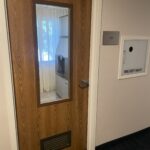Is it my imagination or do most architects wait until the last possible moment to ask for help with their hardware specifications? Why is that?? My theory is that most of them hate hardware so much that they can’t bear to look at it or think about it until it’s almost too late. I feel the same way about my taxes. Nope, I haven’t done them yet. I wonder if H&R Block will take good care of me when I call on April 14th.
I get emergency calls from architects every single week. I just got one today…they’d like the hardware spec by Wednesday, the building standards are a product line I’m not familiar with, and tomorrow morning I’m headed to Delaware with my entire spec team for training that will last the rest of the week. Oh – and I’m one of the trainers. No problem! Don’t get me wrong…I’m happy to get the calls, but the hardware emergencies can be tough to juggle.
It doesn’t have to be this way any longer! We’ve now made it very easy for architects and specifiers to get the help they need! There is an area of the Ingersoll Rand Security Technologies website that was created specifically with architects and specifiers in mind, and by following the Write a Spec link, you can contact a specwriter and ask a question or have us write the specification for you. It’s like the Bat-Phone for hardware help!
 There’s a wealth of useful information on the site too…
There’s a wealth of useful information on the site too…
- LEED information
- BAA/ARRA compliance catalog
- Information about hurricane requirements
- FEMA 361-compliant product data
- Case studies
- Solution sets and virtual tours
- Product information
- Continuing education courses
If there’s something else you’d like to see, just tell us! And don’t put it off any longer – contact a specwriter!
You need to login or register to bookmark/favorite this content.







No need to invoke malice toward hardware; simple procrastination is just as likely.
They have another 83 sections to edit, and they have to corral the owner to talk about the procurement documents, too. Hardware? They’re thinking “easyware”, because they have a consultant to call!
I don’t know, Joel. I’ve heard so many architects say they hate hardware that I created a special URL just for the ones that feel that way – iHateHardware.com! 😀
Hi Lori,
I’ll write your door hardware for this emergency project.
Door hardware is one of the sections that I tackle early, because there are so many requirements from Owners nowadays. From access controls, small-format removable cores, special keying requirements, to maintenance departments preferences, I feel the need to get a jump on that section; plus it offers an opportunity to red mark the door schedule.
Thanks Morriss – that’s so nice of you!!! 😀
I completely agree…we can avoid problems if we start the hardware earlier in the process. Of course, it can go the other way, where I’m asked to write complete hardware specifications for Design Development. Then I write them again, and again, and again as the documents progress. Oh well, if it was easy everyone would do it!
On the other hand, I have also been involved in projects where the hardware was written in a timely fashion and then the hardware consultant not contacted when last minute changes were made to the building design. Because they are not so involved in the process, many architects don’t really understand that even a simple change to a door swing may trigger the need for an additional hardware set.
Oh – that happens ALL THE TIME Peter…then the hardware suppliers think we’re inept because we have hardware for a single door on a pair, or for an aluminum storefront door but the door is all-glass. My favorites are when all of the doors get renumbered on the plans or when a line is inserted into the door schedule for a new door, and the rest of the hardware sets are on the wrong lines. :-\
On more complex projects, I would like to see a discussion between the Owner, Architect, the Hardware Consultant, and the Security Consultant about design standards, access controll, etc. This is especially important on projects where there are no standards (usually private, non-institutional work for local and regional corporations). This might be followed by a “design” meeting to confirm visual quality (samples of lock/latchsets and hardware finishes). The hardware schedule should be started as soon as the plan is finalized and a door schedule can be generated (yes, I know that for some projects, the plan is never set, but…). This meeting should not be viewed as merely a handoff of plans (especially for complex buildings), but should involve a discussion of life safety and accessibility as well as security and access control. Finally, the project should be reviewed once more before the Procurement Documents are issued for bids/pricing.
The reality for many of today’s projects is that design is a moving target, but I would be willing to bet that if the Hardware Consultant were viewed as a member of the design team and kept in the loop, door hardware specs and schedules would be more accurate.
I couldn’t agree more!
Architects are wonderful people. They’re ferociously good, fast, conscientious, three-dimensional problem solvers. Some of them even have the patience to critique or even edit specifications.
But most architects hate writing as much as they hate reading. They especially hate technical writing. And you can’t get much more detailed and technical than door hardware, especially if it includes access control.
There is a certain delusional quality to architects’ avoidance of door hardware, it’s true. They seem to think that they can delegate the whole mess to anyone with “AHC” credentials, even though they don’t always give you all the relevant information.
Dollars to donuts your last-minute caller won’t have the patience, or the time, to click on any of the links you list. Guess at a hardware allowance so they can procrastinate a little longer.
I agree, they are wonderful people. Where would we be without architects? I just wish they would call me a little earlier, and listen when I tell them that not all hardware can be invisible. 🙂